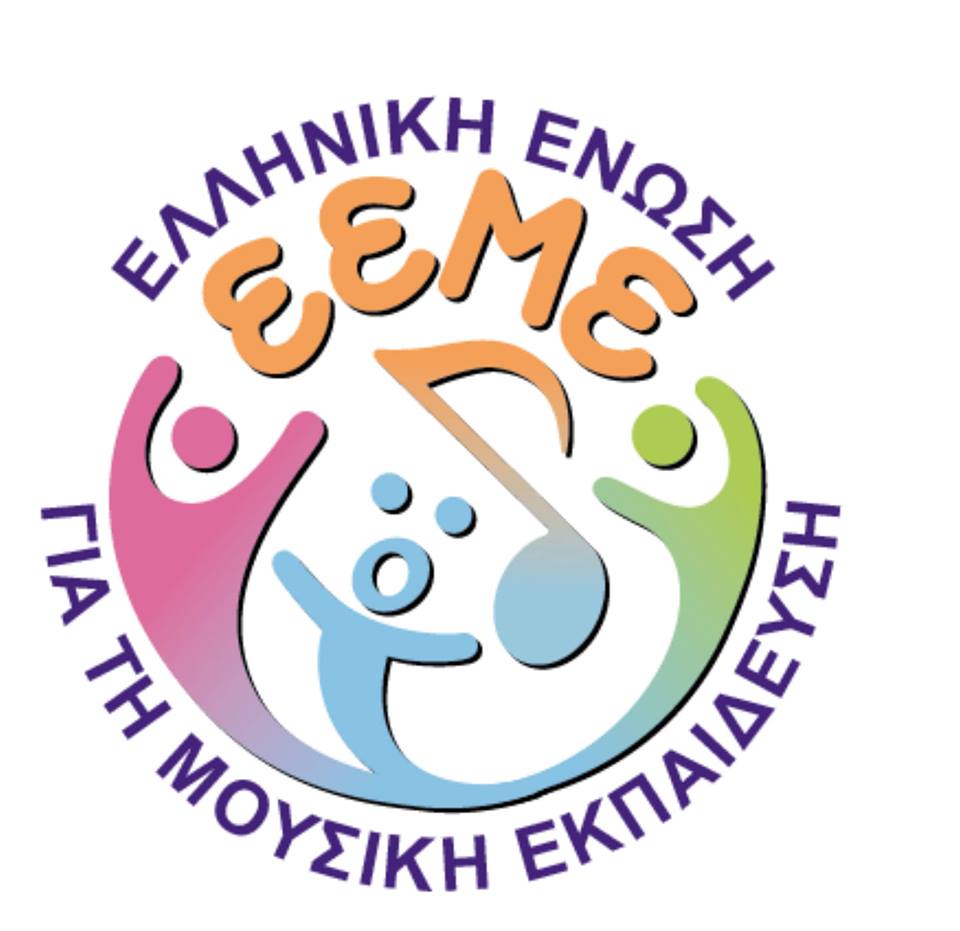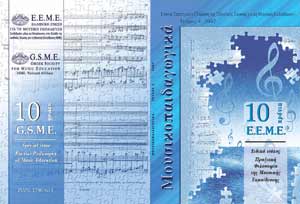This G.S.M.E. 10th anniversary special issue of the Musical Pedagogics Journal originated with a symposium on the topic of David Elliott's Praxial Philosophy of Music Education. The symposium titled Praxial Music Education: Issues and Debates was held in July 21st, 2006 at the 27th World Conference of the International Society of Music Education (ISME) in Kuala Lumpur, Malaysia. This issue of Musical Pedagogics features the full contents of the 2006 ISME Praxial Symposium, translated in Greek (English abstracts).
1) David J. Elliott:The Praxial Philosophy of Music Education: A Summary
2) Polyvios Androutsos: Praxial Philosophy and Educational Praxis
3) Jiaxing Xie: The Praxial Music Education of China - in the Traditional and Post-modern Contexts
4) Heidi Westerlund & Lauri Vakeva: Elliott's Praxialism in Music Education: A Finnish Perspective
5) Jere Humphreys:Plato's views on three modes of music education Praxis: composing, performing and listening
Abstracts:
1) David Elliott
The Praxial Philosophy of Music Education: A Summary
This summary of the praxial philosophy -in attempt to be useful and clear- is organized in relation to seven basic "issues" that are almost always present in music teaching-learning situations: aims, knowledge, teachers, learners, teaching-learning processes, the teaching-learning context, and evaluation.
2) Polyvios Androutsos
Praxial Philosophy and Educational Praxis
Although a single, unitary philosophy for a field as complex as music education is probably not realistic, David Elliott's praxial philosophy represents a significant step forward. Based on the praxial views of Aristotle and others who followed him, Elliott's praxial philosophy has brought into focus the importance of "music making in general and musical performing in particular". Since praxis is the essence of "music-ing" both in musics sonic qualities and its social aspects, Elliott's philosophy "shook the ground" a decade ago by reminding music educators in a comprehensive and detailed way that teaching music is not the same as teaching about music. Because neither music education nor philosophies about it occur in a vacuum, the application of this philosophy (or any other philosophy) to teaching practice faces a variety of obstacles, restraints, and challenges. Some of these challenges, which lie in the realms of the ideological, cultural, political, and social, are presented and discussed in this paper. At first glance, one might argue, for example, that the praxial philosophy probably will not work in most teaching situations, given time and other types of constraints. Also, the redesigning of curricula, teaching materials, and music teacher education programs would be required in order to implement praxial music education in non-performance-oriented countries. Even though the current situation in Greek public schools might seem dissuasive for future implementation of a praxial philosophy, some applications could be made, especially now that the new National Music Curriculum is in effect. With the above in mind, proposals and questions are put forth related to examples of Greek music education.
3) Jiaxing Xie
The Praxial Music Education of China - in the Traditional and Post-modern Contexts
This paper details a wide range of ancient and modem Chinese thought on music and music education. Beginning with a description of Confucius as a music student and music educator, this paper goes on to explain the roots and permutations of praxial music education as it manifests its itself today in Chinese education and culture. For example, although some concepts seem to be uniquely Chinese (e.g., the ideas of "Apperception" and "Nature-Human-in-One"), this paper relates these formulations to what we now call, in the present age, praxialism.
4) Heidi Westerlund & Lauri Vakeva
Elliott's Praxialism in Music Education: A Finnish Perspective
David J. Elliott's praxial philosophy was introduced in Finland in the midst of a change in national curricular policy. Overall, his ideas fitted well with the practical approach and the multicultural perspectives of Finnish music educators. However, a more dynamic and holistic philosophical point of departure was soon envisioned; a point of departure that would take into consideration the rapidly changing cultural dynamics of musical life and the diversity of musical experience it bestows. The article analyzes the points of departure for the critique of David J. Elliott's praxial philosophy in Finland. Phenomenology and critical theory are considered as thematic alternatives to Elliott's approach. Whereas phenomenology criticizes the lack of subjective, somatic aspects of experience, critical theory focuses on the pedagogical relevance of the role of critical reason in educational praxis. Pragmatism, in its social-cultural and contextual reading of praxialism, is proposed as a holistic alternative that in line with contemporary social constructivism suggests a more throughout account of musical learning in community. Furthermore, it refashions Elliott's critique against the aesthetic philosophy; as a general concept, the aesthetic theory does not have to be neglected despite of its strong conceptual ties to the modernist understanding of fine arts and their value. A pragmatist alternative naturalizes the points of departure of aesthetic theory, thus providing tools for further elaborations of praxialism in music education.
5) Jere Humphreys
Plato's views on three modes of music education Praxis: composing, performing and listening
In this brief paper I present some ancient Greek perspectives on three praxial musical activities: composing, performing, and listening. Early founders of modern Western thought created boundaries and hierarchies among these three activities, in addition to the scientific study of music. Under the dualistic conception of reality, or "truth" original musical works became objects. Plato stipulated the use of "good" songs, reserved composition for a select few, and believed that "goodness" in music could be determined objectively by society's leaders, a form of universal "truth" represented in artistic products. The praxis of music performing, regarded as a "practiced habit" and given lower status than composing, was deemed an appropriate leisure-time activity for gentlemen. Virtuoso music performance was to be left to non-citizens, leaving citizens free for more intellectual pursuits. Performance not only separate from, but subordinate to, musical works. In the realm of listening, performers were separated from "audiences". Plato believed that only well-educated people could derive pleasure from "good" music, and he generally deplored the widespread use of popular music. What the ancient Greeks did teach in schools was not music praxis at all, but the scientific study of harmonics, or acoustics, which paralleled other intellectual approaches in schools. Given the pervasive influence of Plato and other ancient Greek philosophers on Western educational and musical praxis, it is not surprising that subsequent educators taught music primarily through theoretical means. For a variety of reasons, David Elliott and others now propose changing the paradigm to emphasize praxial music education.






 Please wait...
Please wait...